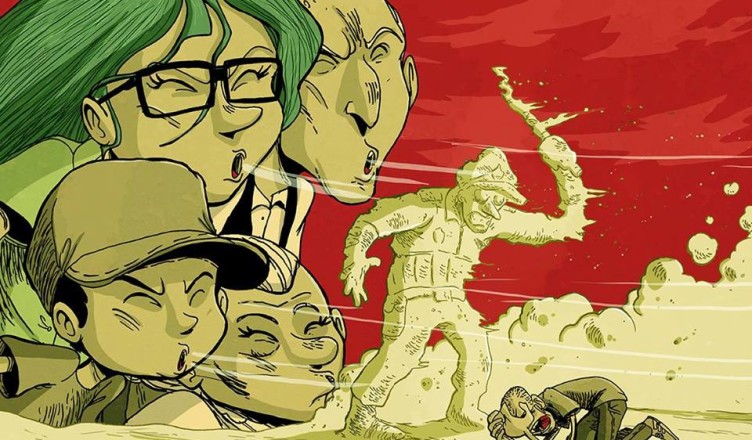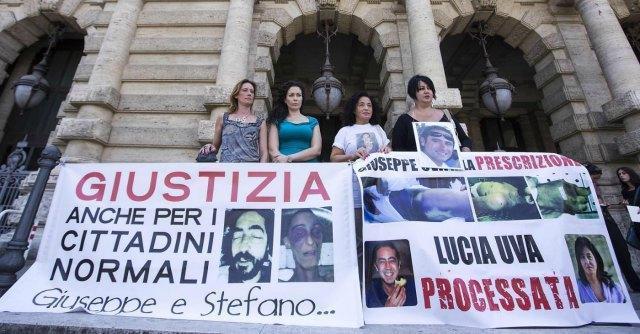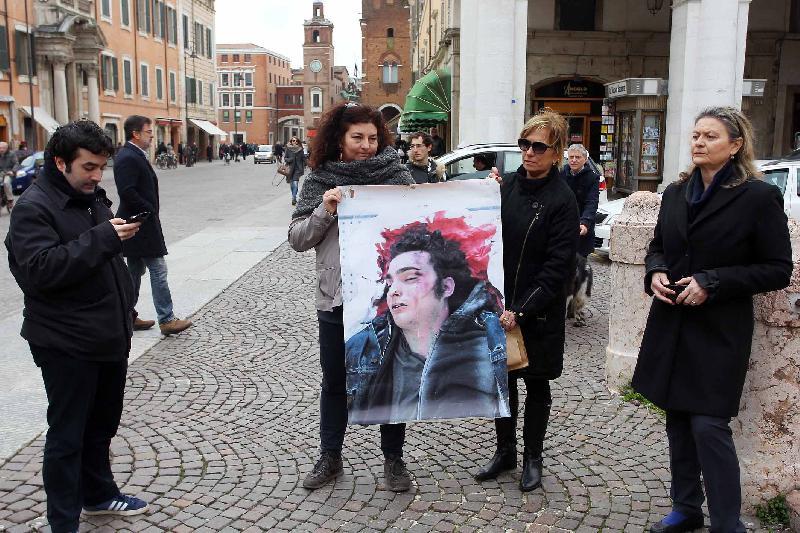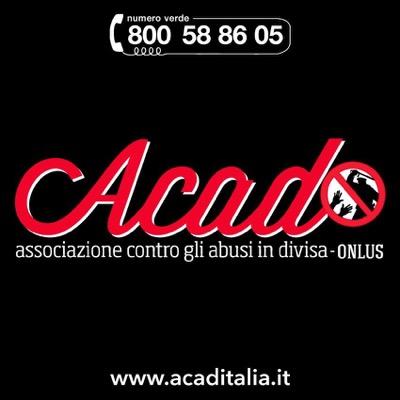Never alone facing abuse in uniform
The United States isn’t the only country with a police brutality problem. In Italy, an association called ACAD provides legal and other resources to victims of police misconduct.
 Ilaria Cucchi shows a picture of Stefano Cucchi's dead body
Ilaria Cucchi shows a picture of Stefano Cucchi's dead bodyThe United States isn’t the only country with a police brutality problem. In Italy, an association called ACAD provides legal and other resources to victims of police misconduct.
The phone lights up and vibrates. It rings three times. If nobody picks it up, the call is automatically diverted to another phone, for another three rings. If still there is no response, the ringing bounces to another number and so on, cascading over a list of users.
Until one of the operators presses the green button on the phone and receives the request for aid. This is the basic structure of the toll free number for the Association Against Abuse in Uniform, known by its Italian acronym ACAD. The group references the acronym that manifests street gangs’ distrust toward the police, ACAB (“All cops are bastards”), transforming it into a support structure against police brutality. The group turns two years old this month.
The group receives about 10 calls a week for prompt intervention against abuses of power. These calls are the emblem of a broken silence in a country realizing it has a problem with law enforcement. Rattling off the rings of this chain means retracing a Spoon River of violent deaths.
It means telling stories that would have drowned in isolation if this process of sharing and mutual aid had not been set in motion. “Each time the ACAD’s toll free number rings, it is a blow to the heart. I hope every call is just a generic request for information or even a silly joke. I hope with all my might not to find myself for the umpteenth time across an unacceptable tragedy,” an ACAD volunteer told il manifesto.
Yet these two years of painful experience teach a lot. “The few hours right after the abuse are the most important,” says Luca Blasi, who works at the Roman chapter of the association. “The victim needs a lawyer immediately. In the event of death, the expert’s opinion is a crucial part of discovery, as well as making sure that the autopsy is carried out properly.”
ACAD employees and volunteers realized that in addition to the technical issues, the communication aspects are also important. In other words, it can be crucial to forcefully and clearly tell the story, to undermine lies in the official version as quickly and widely as possible.

For example, Davide Bifolco was 16 years old when was shot dead during a traffic stop by police in Naples in 2009. The authorities later said he was transporting a mafioso on his Vespa; in truth, the man with him was just a friend. And Federico Aldrovandi, a teenager from Ferrara killed after his arrest in 2005, was described by police as a drug addict who killed himself by literally throwing himself onto a nightstick, breaking it. His mother, Patricia Moretti, was forced to defy decency and put his tortured body on public display to pierce the information wall (three policemen have been definitely condemned for the killing but they are all still in service).
Ilaria Cucchi, whose brother, Stefano Cucchi, was beaten to death while in custody in 2009 (some Carabinieri are now on trial in Rome), was forced to do the same: show the black scars and broken bones of her brother’s body to the press. After a torchlight procession through the streets of Rome, authorities reopened their investigation and an appeal is now pending.
The same loneliness against the authority was managed by Lucia Uva fought the same lonely battle against the authorities after her brother, Giuseppe Uva, a 43-year-old carpenter from Varese, was found dead after a night in Carabinieri custody in 2009.

Such cases “have allowed thousands of citizens to realize that there are people of flesh and blood behind the boast of having beaten up ‘a junkie piece of shit,’” Blasi said. “Hidden behind this horror is not an abstract figure. There is even a smile.”
ACAD grew from a simple intuition: to make available to large numbers of people the legal, communication and political skills acquired over years of battles against repression and prison. No longer is securing justice a niche operation, but a civil right.
The organization held its first public event in January 2014, in Bergamo. “Union is our strength. If we remain alone we can do nothing,” Domenica Ferrulli said that day. Her father, Michele, a 51-year-old laborer, died in police custody in Milan in 2011.
“About Ferrulli, we must remember one important thing,” ACAD volunteers say. “Handcuffing a person, putting his hands behind his back, and then leaning on his body with the knee, belly to the ground, is very dangerous.”
Aldrovandi also died this way. “That position causes suffocation or compression of the heart. That maneuver should not be taught in police academies any longer. But for all we know, it is still the normal practice.”
There are families who have the strength to act, to give speeches and to challenge the authorities. In those cases, ACAD performs support tasks. But often abuses occur in gray areas, in difficult situations, in particular environmental contexts and social conditions. It is not easy to be a victim and at the same time be flung at the media. Here ACAD steps in, taking matters into their own hands, providing legal support, financial assistance and running dogged communication campaigns.
ACAD also lobbies for policy changes that may prevent abuse in the first place. For example, they’re asking for a bill that punishes torture — Italy has no specific law on torture, even though the European Court of Human Rights has requested one. ACAD also demands that police have identification numbers (to hold officers more accountable) and that police be suspended or fired if guilty (it is not uncommon that an officer who kills someone remains on the force until the end of his career).
In the view of the 10 ACAD chapters scattered throughout the country, there is also apparently an excessive use of TSO, the Italian acronym for mandatory health treatments that are sentenced, often too easily, to people unconscious or perceived as “crazy.”
But a TSO can be the opposite of healthy. Andrea Soldi, one of the victims of abuse under ACAD’s care, died last August in Turin after a TSO because of an “atypical strangulation”: The suspects are three policemen and a psychiatrist.
Many cases have been reported at ACAD’s toll free number about beatings at the reception centers for migrants and abuse of power against people forced under house arrest, excessive repression in the name of urban decorum on the edge of notorious “nightlife” neighborhoods and mysterious deaths in custody.
ACAD follows the case of Nicolò and Tommaso De Michiel. The two brothers were in their early 20s in 2009, when they were victims of a police beating in Venice, where they lived. They were taken to the police station, Tommaso among many men in uniform. His case is catalogued in the “Survivors” dossier at ACAD, because the young man escaped with “only” a broken rib, another rib cracked, testicular hematoma, facial trauma, bleeding in the eye, swelling of the lips, and injuries to the wrists caused by dragging.
His father stopped the assailants by entering the station and showing his ID: He was also an officer. He was subsequently suspended from duty for participating in a demonstration to show that not all policemen are like those who beat his children.
–> Read also the interview with Mark Covell, a British journalist beaten by the police in Genoa during the G8 in 2001: Italy’s future after Genoa 2001, an interview with Mark Covell.
(article originally published in Italian at il manifesto on Jan. 7, 2015)

ACAD numbers and website
ACAD’s Facebook page has collected over 40,000 “I like.” On the website acaditalia.com you can find the materials and campaign updates of cases ACAD is following, in addition to information on how to join and support the activities of the association. The toll free number to denounce abuses and find support around the clock is +39-800-588-605.
“The ACAD association,” as stated on its website, “stems from the desire to provide support to the families of victims and those who have been abused but who have not given up and did not accept a legal truth that too many times has proved to favor those who try in every way to hide with impunity behind a uniform. ACAD is anti-fascist and anti-racist, values of freedom and equality that we want to lay claim to.”
I consigli di mema
Gli articoli dall'Archivio per approfondire questo argomento
